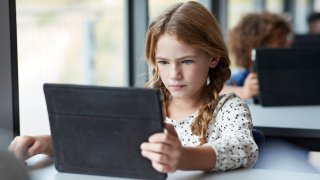
From the moment social distancing and self quarantines to prevent the spread of coronavirus began, my social media feeds filled with posts from parents sharing Pinterest-worthy lesson plans and activities — all to prevent too much screen time.
My kids, ages 11 and 9, have done plenty of activities in the weeks we've spent at home thanks to COVID-19. We've made doll furniture from cardboard boxes, written letters to residents of nursing home facilities, and spent family time in our pool.
But there have also been screens. Glorious screens. Nintendo Switches blasting the latest Animal Crossing game, Zoom calls with friends from school that they may never be in class with again, group Fortnite-playing and so many Baby Yoda memes texted in our family group chat.
In the nearly two weeks at home, I haven't counted how many hours they've spent on screens or questioned whether or not I am a good parent because they just sent their 15th app request that day.
As a mom who regularly works from home, I am surviving. And my kids seem happy, feel connected with their friends and are thoroughly enjoying binge-watching shows like "MasterChef Junior" while I work.
I just don't think "screen time" is that big of a deal, and neither does author, speaker and educator Jordan Shapiro, author of "The New Childhood: Raising Kids to Thrive in a Connected World."
In fact, Shapiro says one of the biggest favors parents can do for their kids is to remove the phrase "screen time" from their family's vocabulary altogether.
U.S. & World
Stories that affect your life across the U.S. and around the world.
It's much more important to consider how the screens are being used than it is to consider how much they're being used.
said Jordan Shapiro, author of "The New Childhood: Raising Kids to Thrive in a Connected World."
"All the research has consistently shown that there's nothing toxic about screen exposure," Shapiro, who has two sons, ages 14 and 12, told TODAY Parents. "You don't turn into a zombie. Your brain doesn't rot. Therefore, the question of duration is not really relevant."
Shapiro says it's more important for parents to be concerned with how their kids are engaged with screen-based media.
"Are they just binge-watching YouTube videos, or are they involved in something creative?" he asked. "Are they playing alone, or are they involved in online, interactive multiplayer activities? Are they composing electronic music, or are they scrolling mindlessly through TikTok? It's much more important to consider how the screens are being used than it is to consider how much they're being used."
Shapiro says using descriptors like food-based metaphors — phrases like a healthy screen diet, balance and moderation — have given society an attitude of binging and purging or needing to detox from screens. And, talking about screen time in terms of drugs or addiction can be upsetting to kids.
"Imagine if your parents had told you that the primary way you find meaning and social connection — the very tool you use to articulate your precarious developing identity — is tantamount to cigarettes, heroin and crack," said Shapiro. "That's what upsets me most."
Download the TODAY app for the latest coverage on the coronavirus outbreak.
In the face of the coronavirus pandemic, Shapiro says screen time isn't optional, but adds that it's important to remember that even before the days of social distancing, screens were a daily part of the lives of both adults and kids.
"Kids are not only required to use digital technology for schoolwork, but also it's the platform for social connection — it's how they connect with their cohort of peers," Shapiro explained. "Screen time was already normal (before coronavirus) and already needed to be a non-issue. Now, parents have no choice but to accept it."
So should parents feel guilty about the amount of time their kids spend on screens?
Shapiro says no.
"Instead, ask a lot of questions about whether or not your children are doing enough other things," said Shapiro. "Are they reading? Are they getting exercise? Are they doing creative projects? If the answer to all these questions is yes, then you've got nothing to worry about. There's no bad amount of screen time, but there is such a thing as being narrow minded in your interests."
As for my kids, their cooking show addiction has had fruitful results. Last week, we baked a cake from scratch and my daughter cooked a pasta meal by herself. Meanwhile, playing LEGO video games and watching "LEGO Masters" inspires them to build with their own bricks.
Adults use screens in their daily lives, so why shouldn't our kids?
Shapiro agrees, saying in a time like today, when screens offer us some of our only opportunities for human-to-human connections, they're actually a necessity.
"My kids are video conferencing with their cousins and grandparents," said Shapiro. "They're also meeting up with all their friends to hang out in digital spaces...to have virtual playdates. But the biggest benefit I'm hearing about is that there's a lot of family screen time happening — families are viewing Netflix together and parents are playing video games with their kids."
"Parents are finally seeing what screen time really means," Shapiro continued. "So much of the fear has been based on misguided assumptions, and I suspect that grownups are going to discover that digital screen media use was always a lot less superficial than they imagined."
This story first appeared on TODAY.com. More from TODAY:



